- Top Employee Onboarding Software
- Why Use Employee Onboarding Software?
- Key Features of Effective Onboarding Software
- How To Choose The Right Onboarding Software?
- Which is the Best Onboarding Software?
- Frequently Asked Questions (FAQs)
- What Is Upskill And Reskill?
- Difference Between Reskilling And Upskilling
- Upskilling for Workplace Advancement
- Reskilling for Career Transformation
- Crafting Successful Upskill and Reskill Strategies
- Upskill And Reskill Strategizing: Things to Keep in Mind
- Measuring the Impact of Skill Development Initiatives
- Frequently Asked Questions
- What’s a Skill Gap?
- Employee Skill Gap Analysis: Why Do We Need It?
- How To Conduct Employee Skill Gap Analysis?
- Addressing Skill Gaps Through Training and Hiring
- Utilizing Skills Gap Analysis for Strategic Planning
- Leveraging Employee Skill Gap Analysis: Things To Keep In Mind
- Frequently Asked Questions
- Transformative Role of AI in Talent Acquisition
- Impact of AI on Business Recruiting
- Overcoming Challenges in AI-Driven Talent Acquisition
- Starting with AI in Talent Acquisition
- Future Landscape of AI in Talent Acquisition
- Frequently Asked Questions
- HR In The Hot Seat - Challenges With Evolving Workforce
- Mastering Effective HR Management: Tips For Overcoming Challenges
- Summing Up
- The Future of HR: Key Trends for 2024
- Skill-Based Hiring
- Prioritizing Employee Experience, Engagement & Well-being
- AI-Empowered Workforce Evolution and Its Impact
- Taking Diversity, Equity, and Inclusion Beyond Mandates
- Hybrid and Remote Work
- Embracing the Gig Economy and Blended Workforce
- Transparent HR Practices
- Climate Change Adaptation in HR Practices
- Leveraging HR Analytics for Data-Driven Decisions
- Continuous Learning & Development to Improve Productivity
- The Office Buzz in 2024
- Bottom Line - HR Operating Model Needs A Shift
- Importance and Impact of Recognizing Employee Birthdays
- Professional Birthday Wishes for Employees (All Experience Levels)
- Personalized Birthday Wishes for Employees in Different Roles
- Fun Birthday Wishes for Employees (with Templates)
- Birthday Wishes for Remote Employees
- Heartfelt Birthday Wishes for Employees
- Belated Birthday Wishes for Employees
- Simple & Sweet Birthday Wishes for Employees
- Celebrating Employee Birthdays: Ideas and Traditions
- Tips and Ideas for Sending Birthday Wishes to Employees
- Closing Thoughts
- Frequently Asked Questions
- What Is An Employee Referral?
- Benefits of Implementing Employee Referral Programs
- Setting Up an Effective Employee Referral Program
- Employee Referral Email
- Employee Referral Scheme
- Overcoming Challenges of Employee Referrals
- Companies with Best Employee Referral Programs
- Employee Referral Programs: Best Practices
- Closing Thoughts
- Frequently Asked Questions (FAQs)
- Importance of Team Building Activities
- Types of Team Building Activities
- Outdoor Team Building Activities for Employees
- Indoor Team Building Activities for Employees
- Easy Team Building Activities for Remote Employees
- Team Building Activities For New Employees (Icebreakers)
- Fun Team Building Activities for Different Goals
- To Boost Communication and Collaboration
- To Reduce Stress Levels and Promote Well-being
- Aligning Team Purpose and Values with Strategic Activities
- Final Remarks
- Frequently Asked Questions
- Importance of Employee Appreciation Quotes
- Work Appreciation Quotes for Employees
- Employee Appreciation Quotes for Hard Work Recognition
- Employee Appreciation Quotes for Teamwork and Collaboration
- Appreciation Quotes for Celebrating Employee Anniversaries and Milestones
- Employee Appreciation Quotes for Strong Work Ethics
- Employee Appreciation Quotes for Project & Goal Completion
- Employee Appreciation Quotes for Quality of Work
- Employee Appreciation Quotes for Creativity and Innovation
- Appreciation Quotes for Managers
- Peer-to-Peer Employee Appreciation Quotes
- Appreciation Quotes for Employees Leaving the Company
- Employee Appreciation Quotes for Thoughtful Gestures
- Funny Employee Appreciation Quotes
- Short Employee Appreciation Quotes
- Employee Appreciation Quotes for Different Roles
- Employee Appreciation Quotes for Senior Leadership
- Creative Ways to Use Employee Appreciation Quotes
- Summary
- Frequently Asked Questions (FAQs)
- What is Employee Satisfaction?
- Importance of Employee Satisfaction
- Objectives of Employee Satisfaction
- Employee Satisfaction vs. Employee Engagement
- Key Reasons for Employee Dissatisfaction
- Strategies for Improving Employee Satisfaction
- Ways to Measure Employee Satisfaction
- Best Practices for High Employee Satisfaction
- Final Remarks
- Frequently Asked Questions (FAQs)
- How to Craft Effective Employee Appraisal Comments
- Key Areas to Focus in Performance Review
- Comments On Hard Work & Dedication
- Assessing Interpersonal Skills
- Evaluating the Ability to Collaborate & Work in Teams
- Gauging Punctuality
- Commenting on Communication Style
- Reviewing Time Management and Productivity
- Leadership in Performance Appraisals
- Assessing Creativity & Innovation
- Evaluating Problem-Solving Abilities
- Recognizing Flexibility and Dependability in Reviews
- Employee Appraisal Comments for Different Roles
- Summary
- Frequently Asked Questions (FAQs)
- Employee Grievance Meaning
- Importance of Employee Grievance Process
- Types of Workplace Grievances
- Reasons for Employee Grievances
- Employee Grievance Procedure
- Steps in the Employee Grievance Handling Process
- Employee Grievance Form Example
- Final Remarks
- Frequently Asked Questions (FAQs)
- What is Company Culture?
- Importance of Company Culture
- Types of Company Culture
- Factors Contributing to Organizational Culture
- Assessing & Developing Corporate Culture
- Company Culture - It’s not just Perks or Feels
- Good Company Culture Examples
- Developing Company Culture: Best Practices
- Closing Thoughts
- Frequently Asked Questions (FAQs)
- What is Employee Empowerment?
- Benefits of Empowering Employees
- Employee Empowerment vs. Micromanagement
- Strategies for Effective Employee Empowerment
- Role of Managers in Fostering Empowerment
- Organizational Structure Supporting Empowerment
- Overcoming Barriers to Employee Empowerment
- Frequently Asked Questions (FAQs)
- What is Employer Branding?
- Importance of Employer Branding Strategy
- How to Build an Employer Branding Strategy?
- Strategies for Building a Strong Employer Brand
- How to Measure and Boost Your Employer Branding Success?
- Examples of Strong Employer Brand Strategy
- Best Practices for an Effective Employer Branding Strategy
- Closing Thoughts
- Frequently Asked Questions (FAQs)
- What are Employee Wellness Programs?
- Importance of Employee Wellness Programs
- Examples of Employee Wellness Programs
- Real-Life Examples of Corporate Wellness Programs
- Strategies for Encouraging Participation
- Supporting Diverse Employee Needs
- Creating Comprehensive Wellness Programs
- Measuring the Impact on Business and Employees
- Closing Thoughts
- Frequently Asked Questions (FAQs)
- What is Talent Management?
- Developing a Winning Talent Management Strategy
- Models and Frameworks
- Tips for Framing Effective Talent Management Strategy
- Looking Ahead: Recent Trends in Talent Management
- Frequently Asked Questions
- Role of AI in HR: Addressing Common Challenges
- Artificial Intelligence in HR Processes
- AI Tools for HR Functions
- How to Adopt AI in HR?
- Addressing Challenges of AI in HR
- Ethical and Responsible AI Use
- The Future of AI in HR
- Closing Thoughts
- Frequently Asked Questions
- What is Performance Management?
- Elements of Effective Performance Management
- Performance Management Cycle
- Differentiating Performance Management
- Benefits of Performance Management With Examples
- Challenges faced in Performance Management and their Solutions
- Future Trends in Performance Management
- Frequently Asked Questions
- Changing Role of HRM
- Changing Role Of HR Manager
- Technology and the Changing Role of HRM
- The Rise of AI and Machine Learning in HR
- Mobile Technology's Impact on HR Practices
- The Significance of People Analytics in HR
- Navigating the Future of HR Technology
- Final Remarks
- Frequently Asked Questions
- Compensation Management Meaning
- Compensation Types
- Breaking Down The Compensation Management Process
- HR Software for Compensation Management
- Current Trends in Compensation Management
- Frequently Asked Questions
- Defining Flexible Work Arrangements
- Flexible Working: Advantages for Businesses
- Challenges of Flexible Work Arrangements
- Crafting Flexible Working Practices
- Types Of Flexible Work Arrangements
- Comparing Flexible Work Arrangements
- Real-Life Examples of Flexible Work Arrangements
- Final Remarks
- Frequently Asked Questions
- Conflict Resolution Meaning
- Conflict Origins
- Tried & Tested Conflict Resolution Strategies
- Methods of Conflict Management at Workplaces
- Conflict Resolution Strategies: Top Management Tips
- Summary
- Frequently Asked Questions
- Career Development Meaning
- Career Development Plan for Employees
- Career Development in HRM: Growth Ideas For Employees
- Issues in Career Development and Their Solutions
- Closing Thoughts
- Frequently Asked Questions
- Understanding Compensation
- Exploring Benefits
- Difference between Compensation and Benefits
- Compensation & Benefits Structure
- Final Remarks
- Frequently Asked Questions
- Defining Recruitment in HR Practices
- Exploring Talent Acquisition in HR
- Understanding Talent Acquisition vs Recruitment
- When to Recruit or Acquire Talent
- Talent Acquisition vs Recruitment: Responsibilities
- From Recruitment To Talent Acquisition
- Closing Thoughts
- Frequently Asked Questions
- Work Culture Meaning
- Types of Work Cultures
- Components of Culture
- Best Work Culture Examples Set By Top Companies
- Creating a Positive Work Culture
- Closing Thoughts
- Frequently Asked Questions
- Defining Learning vs Development
- Importance of Learning and Development
- L&D Activities for Employees
- Choosing the Right L&D Activities
- Crafting an Effective L&D Strategies
- Aligning L&D Strategy with Business Goals
- Designing Engaging Learning Journeys
- Learning and Development Process: KPIs
- ROI in Learning and Development
- Emerging Trends in L&D
- Closing Thoughts
- Frequently Asked Questions
- What Is Leadership Development?
- Key Skills for Leaders
- How To Develop Leadership Skills in Organizations?
- What Is A Leadership Development Program?
- How To Develop A Leadership Development Program?
- Example of A Leadership Development Plan
- Benefits of Leadership Development Training
- Frequently Asked Questions
- Defining Diversity Training
- Importance of Diversity Training
- What are the Types of Diversity?
- Types of Diversity Training Methods
- Diversity Training Activities
- Choosing A Diversity Training Program
- How to Implement Diversity Initiatives
- Best Diversity Training Programs (Real-Life Examples)
- Improving the Effectiveness of Diversity Training
- Tracking and Evaluating the Results of DE&I Training Efforts
- Essential Elements for Successful Diversity Training
- Closing Thoughts
- Frequently Asked Questions
- Defining Occupational Health & Safety
- Evolution of Workplace Health and Safety
- Identifying Common Workplace Hazards
- Global Impact on Occupational Health & Safety
- Managing Employee Health and Safety Risks
- Occupational Health and Safety Problems
- Future of Occupational Health and Safety
- Frequently Asked Questions
- Employee Orientation Defined
- Employee Onboarding Explained
- Orientation and Onboarding: Understanding the Difference
- Importance of Orientation and Onboarding
- Crafting Comprehensive Integration Strategies
- Quick Tips for Orientation and Onboarding
- Frequently Asked Questions
- What is HR Metrics?
- Importance of HR Metrics
- HR Metrics Examples in Recruitment
- HR Metrics Examples in Employee Retention
- HR Metrics Examples in Revenue
- Other Common HR Metrics
- Soft HR Metrics Example
- HR Metrics Formula
- Utilizing HR Metrics Effectively
- Future of HR Metrics
- Summary
- Frequently Asked Questions
- Defining Decision Making Process
- Key Concepts In Decision Making
- Decision Making & Problem Solving
- Tips For Improving Decision Making Skills
- Selected Practice Questions & Answers
- Conclusion
- Frequently Asked Questions (FAQs)
- A case(s) of miscommunication
- The devil is in the (resume) details
- One for the complaints!
- What is an Exit Interview?
- Benefits of Exit Interviews to an Organization
- How to Conduct Exit Interviews?
- Exit Interview: Sample Questions to Ask
- Overcoming Challenges of Exit Interviews
- Exit Interviews: Best Practices
- Closing Thoughts
- Frequently Asked Questions
- Technology in the Workplace
- Benefits of Tech Integration
- Technology in the Workplace: Key Functions
- How Technology Normalized Remote Work
- Workplace Technology: Top Tools and Software
- Steps for Effective Technology Implementation
- Overcoming Tech Implementation Challenges
- Ethical Considerations in Tech Use
- Keeping Pace with Tech Trends
- Closing Thoughts
- Frequently Asked Questions
- What is Ethical Leadership?
- Principles of Ethical Leadership
- Difference between Ethics and Integrity
- Importance of Ethical Leadership
- Ethical Leadership in Practice
- Overcoming Challenges
- Frequently Asked Questions
- Embracing Change Management
- Mastering People Analytics
- Enhancing Stakeholder Relationships
- Navigating Diversity, Equity & Inclusion
- Upholding Ethics and Data Privacy
- Developing Critical Thinking
- Advancing Negotiation Techniques
- Fostering Inter-departmental Collaboration
- Building Resilience in HR
- Frequently Asked Questions
- What is Mental Health?
- Benefits of a Mentally Healthy Workforce
- Prioritising Mental Health: Creating a Culture of Support
- Final Remarks
- Frequently Asked Questions
- Gen Z vs Millennials - What is the difference?
- Retain and Engage Gen Z Employees: Need and Strategies
- Strategies to Retain and Engage Gen Z Employees
- Rethinking Requirements
- Final Remarks
- Frequently Asked Questions
- Understanding Millennial Leadership Needs
- Key Leadership Skills for Millennials
- How To Develop Millennial Into Leaders
- Additional Strategies to Develop Leaders
- Learning Preferences of Millennials
- Benefits of Investing in Millennial Leaders
- Closing Thoughts
- Frequently Asked Questions
- Understanding Fluff
- Examples of Interview Fluff
- Identifying Interview Fluff
- Addressing Interview Fluff
- Seeing Through the Fluff
- Frequently Asked Questions
- What is the Gender Pay Gap?
- Is the Gender Pay Gap Real?
- Factors Affecting the Gender Pay Gap
- How Age Impacts Women’s Earnings
- The ‘Motherhood Penalty’
- Education's Role in Wage Differences
- Racial and Ethnic Disparities in Pay
- Closing the Gender Gap
- Frequently Asked Questions
- Top Weirdest Late-To-The-Office Excuses
- The Fine Art of Balancing Wit and Wisdom in HR
- Understanding Social Media Recruiting
- Crafting Your Social Media Recruitment Strategy
- Implementing Your Strategy Effectively
- Popular Platforms for Recruitment
- Navigating the Downsides of Social Media Recruiting
- Measuring Success and Adjusting Strategy
- Summary
- Frequently Asked Questions
- Who Is A High Potential (HIPO) Employee?
- Characteristics of A High Potential (HIPO) Employee
- High Potential Employee Identification
- Grooming High Potential Employees
- Why High Potential Employees Leave
- How Do You Retain High Potential Employees?
- High Potential Employee Development: Best Practices
- Closing Thoughts
- Frequently Asked Questions
- What is Digital Fluency?
- Why Digital Fluency Matters?
- Difference between Digital Literacy and Digital Fluency
- Key Components of Digital Fluency
- Achieving Digital Fluency
- Overcoming Challenges
- Future of Workforce Digital Fluency
- Frequently Asked Questions
- What is Loud Quitting?
- Pros and Cons of Loud Quitting
- Reasons Behind the Trend
- Analyzing the Impact
- How HR Can Navigate the Loud Quitting Uproar
- Preventive Strategies
- Closing Thoughts
- Frequently Asked Questions
- Defining Emotional Intelligence in HR
- Why Emotional Intelligence Matters for HR Leaders
- How To Build Emotional Intelligence in HR
- Integrating EQ into HR Practices
- Impact of EQ on Company Culture
- Emotional Intelligence in HR: Major Challenges
- Final Remarks
- Frequently Asked Questions
- Understanding Internal Job Posting
- Internal Job Posting: Pros and Cons
- The Internal Job Posting Process
- Writing Effective Ads for Internal Job Posting
- Strategies for Success of Internal Job Posting
- Summary
- Frequently Asked Questions
- Understanding Workplace Bias
- Common Types of Bias in HR
- Closing Thoughts
- Frequently Asked Questions
- What is a Dry Promotion?
- Dry Promotion: Pros and Cons for Companies
- Impact of Dry Promotion on Employee Retention
- Preventing Talent Loss After Dry Promotions
- Closing Thoughts
- Frequently Asked Questions
- What Is A Stay Interview?
- Importance Of Stay Interviews
- Benefits And Challenges Of Stay Interviews
- Planning And Conducting Stay Interviews
- Stay Interviews: 20 Sample Questions To Ask
- Best Practices For Effective Stay Interviews
- Summary
- Frequently Asked Questions
- Who Is A Boomerang Employee?
- Reasons For Returning
- Benefits Of Hiring Boomerang Employees
- Challenges Of Rehiring
- Interviewing Boomerang Candidates: Sample Questions
- Enhancing The Hiring Process
- Making Informed Decisions
- Final Remarks
- Frequently Asked Questions
- Talent Pipeline Meaning
- Significance of Talent Pipelines
- Advantages of a Talent Pipeline
- Building a Talent Pipeline
- Maintaining a Talent Pipeline
- Attracting Top Talent
- Implementing the Strategy
- Frequently Asked Questions
- What is Micromanagement?
- Recognizing Micromanagement
- Leadership versus Micromanagement
- Keeping Micromanagement in Check
- Beyond Micromanagement
- Summing Up
- Frequently Asked Questions
- Recognizing Signs Of A Bad Hire
- Understanding The Impact On Teams
- Dealing With A Bad Hire
- Preventing Future Bad Hires
- Closing Thoughts
- Frequently Asked Questions
- Defining Neurodiversity
- Importance of Neurodiversity in the Workplace
- Moving Towards Inclusive Environments
- Final Remarks
- Frequently Asked Questions
- Understanding the Generation Gap
- Multigenerational Workforce: Debunking Stereotypes
- Strategies for Bridging the Gap
- Benefits of a Multigenerational Workforce
- Final Remarks
- Frequently Asked Questions
- Defining Productivity Theatre: All Show, No Go
- 5 Key Drivers of Fake Productivity
- Solutions to Combat Productivity Theatre
- Summary
- Frequently Asked Questions
- Defining Grumpy Staying
- Why do Grumpy Stayers not Leave?
- Recognizing the Signs
- Exploring the Causes
- Understanding the Impact
- Addressing the Issue
- Taking Action: Addressing Grumpiness with Empathy
- After the Conversation
- When Grumpy Staying Continues
- Closing Thoughts
- Frequently Asked Questions
- The Rationale Behind Office Peacocking
- Impact on Company Culture
- Impact on Employees
- Case Studies: Examples of Office Peacocking
- The Downside: Potential Pitfalls of Office Peacocking
- Practical Tips for Implementing Office Peacocking
- Frequently Asked Questions
- 13 Common Mistakes Young Managers Make
- Strategies To Avoid Mistakes (Individual Growth)
- How Young Managers Can Boost Teamwork
- Learning From Errors
- Summary
- Frequently Asked Questions
- Understanding Great Regret - What causes the shift shock?
- Impact of Great Regret
- How can HR help make the situation better?
- Closing Thoughts
- Frequently Asked Questions
- Understanding the HR Budget
- Key Components of an HR Budget
- Preparing an HR Budget Step-by-Step
- Importance of HR Budgeting in Management
- Final Remarks
- Frequently Asked Questions
- What are Pre-Employment Assessments?
- Importance of Pre-Employment Testing
- Types of Pre-Employment Assessments
- 15 Tips for Creating Effective Pre-Employment Assessments
- Closing Thoughts
- Frequently Asked Questions
- Exploring the Productivity Paradox
- Understanding the Impact of Solow Paradox
- Productivity Paradox: Why it Matters for Recruiters & HRs
- Identifying Causes and Challenges
- Strategies for Enhancing Productivity
- AI & the Modern-Day Productivity Paradox
- Beyond Technology: Building a Productive Workforce
- Summary
- Frequently Asked Questions
- Understanding the Great Reshuffle 2.0
- Preparing Leaders for the Change
- HR’s Role in Handling Great Reshuffling 2.0
- The Way Ahead
- Frequently Asked Questions
- Definition Of Managerial Grid
- Managerial Grid Theory Explained
- Application Of Managerial Grid
- Criticisms And Limitations
- Evolution And Contemporary Perspectives
- Integrating Managerial Grid With Other Models
- Practical Steps For Implementing Managerial Grid
- Conclusion
- Frequently Asked Questions
- Understanding Skills Taxonomy
- Why do we Need Skills Taxonomy?
- Benefits of Skills Taxonomy
- Components of Skills Taxonomy
- Building a Skills Taxonomy: A Step-by-Step Guide
- Skill Taxonomies vs Intelligence Tools
- Closing Thoughts
- Frequently Asked Questions
- Definition Of Team Building
- Stages Of Team Development
- Top 10 Strategies For Effective Team Building
- Team Building Activities
- Best Practices For Effective Team Building
- Setting Team Building Objectives
- Challenges In Team Building
- Conclusion
- Frequently Asked Questions (FAQs)
- Defining Job Shadowing
- Unpacking the Benefits
- Setting Up the Experience
- Job Shadowing vs Internship
- Dos and Don'ts for HR Professionals
- Closing Thoughts
- Frequently Asked Questions
- Employee Journey Mapping: Meaning & Importance
- Stages of the Employee Journey
- Steps for Effective Mapping
- Employee Journey Map: Where does it begin?
- Employee Journey Map: Template
- Best Practices & Tips
- Summary
- Frequently Asked Questions
- Why are Performance Appraisals needed?
- Evolution of Performance Management
- Modern Performance Practices
- Benefits of Modern Performance Appraisals
- The Future
- Frequently Asked Questions
- Is Experience the Sole Indicator of Success?
- Why Hire Inexperienced Talent?: Key Advantages
- Skills to Look For in Inexperienced Talent
- Challenges and Considerations in Hiring Inexperienced Talent
- Final Remarks
- Frequently Asked Questions
- What is a Company Retreat?
- Company Retreat Ideas: Team-Building & Exploration
- Relaxation and Celebration
- Planning Your Retreat: Things to Keep in Mind
- Closing Thoughts
- Frequently Asked Questions
- Understanding HR Forecasting
- HR Forecasting Key Concepts
- Steps for Implementing HR Forecasting
- Common HR Forecasting Methods
- Closing Thoughts
- Frequently Asked Questions
- What is ESG?
- HR and ESG - Why Care?
- ESG in HR Strategy
- Challenges for HR
- Future of ESG in HR
- Frequently Asked Questions
- Defining the Great Betrayal
- Reasons for Its Spread
- Impact on Workers
- Impact on Corporations
- Rebuilding Trust & Valuing Employees
- Closing Thoughts
- Frequently Asked Questions
- Importance of Clear Expectations
- Setting Expectations Early
- Communicating Expectations Effectively
- Differentiating Expectations
- Reviewing and Adjusting Expectations
- Summing Up
- Frequently Asked Questions
- Understanding KRA Frameworks And Models
- KRAs vs KPAs and KPIs
- Monitoring and Tracking KRAs
- KRAs in Various Roles
- Impact of KRA Frameworks and Models on Organizational Success
- Frequently Asked Questions
- Where: The Place of Work
- When: The Time of Work
- How Much Work: Alternate Employment Models
- Who Does the Work: Intelligence
- Designing Organizations with the Four Dimensions of Work
- Summing Up
- Simplifying Processes: The Foundation of Efficiency
- Reducing Unnecessary Meetings: Reclaiming Valuable Time
- Building Strong Accountabilities: Ensuring Responsibility
- Role of HR in Addressing Inefficiencies
- Continuous Improvement: A Commitment to Excellence
- Leadership's Role in Driving Efficiency
- Conclusion: A Holistic Approach to Efficiency
- Understanding Financial Freedom
- Benefits of Empowering Employees Financially
- Empowering Employees Through Financial Literacy
- Financial Topics That Need Attention Based On Career Stage
- Summing Up
- Frequently Asked Questions
- Defining Employee Voice
- Benefits of Amplifying Employee Voice
- Strategies and Tools
- Encouraging Participation
- Closing Thoughts
- Frequently Asked Questions
- Appraisal Blues: Signs of Unhappy Employees
- Addressing Unhappiness Post-Appraisal
- Non-Monetary Solutions for Dissatisfied Employees
- Summing Up
- Frequently Asked Questions
- Women in the Middle Eastern Workforce
- Importance of DEIB
- Role of HR in Building Inclusive Workplaces for Women
- Measuring Inclusion Progress: Key Metrics
- Closing Thoughts
- Frequently Asked Questions
- Preparing for the Conversation
- Conducting the Conversation
- Best Practices for the Talk
- After the Conversation
- Helping Employees Grow
- Frequently Asked Questions
- Understanding HR Exhaustion
- Factors Leading To HR burnout
- Impact Of HR Burnout
- Strategies To Prevent And Manage HR Burnout
- Role Of Technology In Preventing Burnout
- Celebrating HR Successes
- Summary
- Frequently Asked Questions
- Common Mistakes When Hiring Young Talent
- Building Connections with Candidates
- Summary
- Frequently Asked Questions
- Walking a mile in the employee’s shoes
- Conducting Humane Layoffs
- Remote Layoffs Management
- Supporting Laid-off Workers
- Managing the Aftermath
- Wrapping Up
- Frequently Asked Questions
- Importance of Shortening Time-to-Hire
- Shortening Hiring Time: Pre-Application Stage
- Reducing Hiring Time: Application Stage
- Hacks to Shorten Hiring Time: Interview Stage
- Reducing Hiring Time: Offer Stage
- 5 Other Important Hacks & Strategies
- Final Remarks
- Frequently Asked Questions
Emotional Intelligence In HR: Importance, Strategies & Challenges
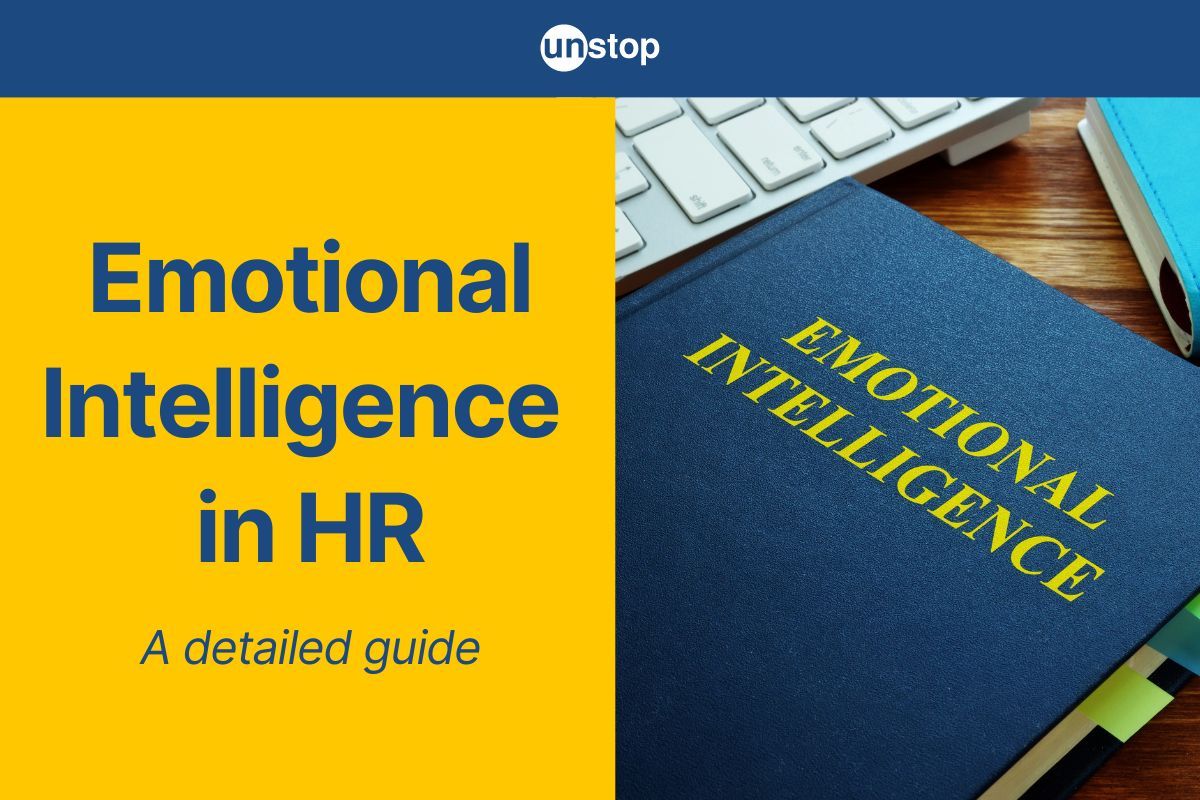
In a world driven by data and metrics, the human touch of emotional intelligence stands out as a beacon of understanding and connection. By integrating emotional intelligence in HR practices, organizations can navigate challenges with finesse, balancing logic with empathy for optimal outcomes.
Embracing this paradigm shift empowers HR professionals to cultivate meaningful relationships, enhance employee engagement, and drive organizational success through a deeper understanding of human emotions.
Let’s understand what emotional intelligence in HR entails and how it can be cultivated across organizations.
Defining Emotional Intelligence in HR
What is Emotional Intelligence?
Emotional intelligence (EQ) refers to one's ability to observe, understand, and manage his or her own emotions as well as those of others. It involves skills such as empathy, self-awareness, self-regulation, and social skills.
Psychologist Daniel Goleman popularized the concept of Emotional Intelligence in the 1990s through his book "Emotional Intelligence: Why It Can Matter More Than IQ."
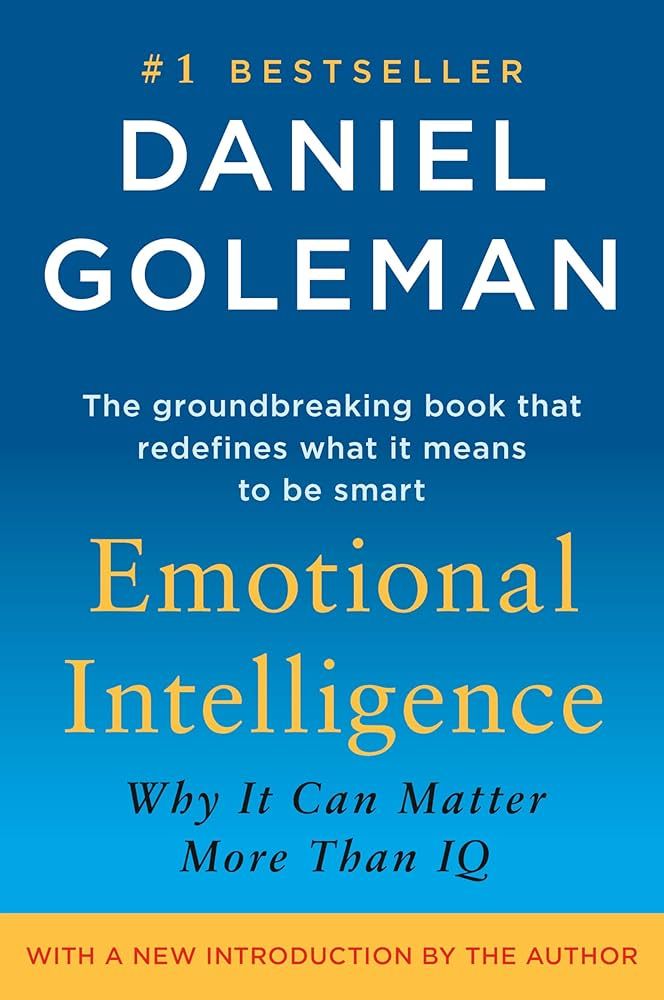
Source: Amazon
Goleman's work highlighted the importance of emotional intelligence in personal and professional success, emphasizing its role in leadership, decision-making, and relationships. Emotional intelligence has since become a key focus in various fields, including psychology, education, and business, as a critical factor in overall well-being and effectiveness.
Emotional Intelligence in HR: Key Components
Emotional intelligence plays a crucial role in Human Resources (HR) by emphasizing the ability to understand and manage emotions effectively.
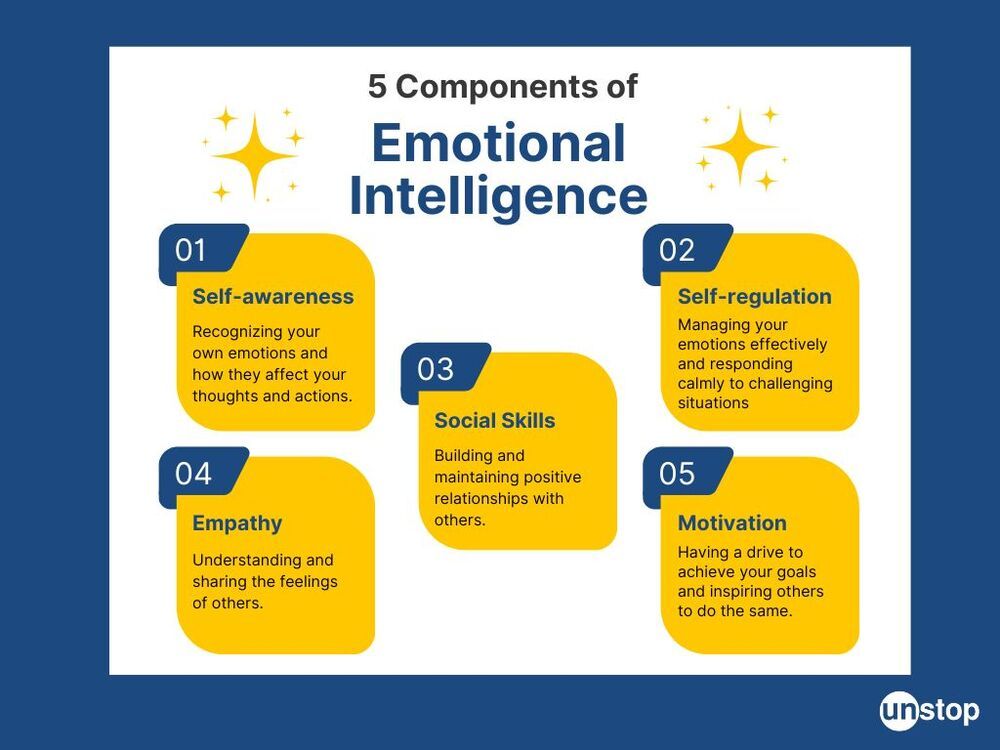
Here’s what each component entails:
- Self-awareness involves recognizing one's emotions and understanding their impact on behavior. Individuals with high levels of self-awareness can accurately assess their strengths and weaknesses.
- Self-regulation focuses on managing emotions constructively. This component enables individuals to control impulsive reactions and adapt to changing circumstances in a professional setting.
- Social skills encompass the ability to build relationships and communicate effectively with others. Employees with strong social skills can collaborate efficiently, resolve conflicts, and inspire teamwork within the organization.
- Empathy involves understanding and considering others' feelings. It enables HR professionals to connect with employees on a deeper level, fostering trust and mutual respect.
- Motivation is having the drive to achieve your goals and inspiring others to do the same. It enables individuals to consistently deliver high performance.

Why Emotional Intelligence Matters for HR Leaders
Emotional intelligence (EQ) is a crucial quality for success in HR, perhaps even more important than traditional qualifications. Here's why:
- Building Relationships: HR professionals deal with a wide range of people, from executives to entry-level employees. Strong EQ allows them to connect with everyone on a deeper level, fostering trust and open communication.
- Conflict Resolution: HR frequently navigates sensitive situations and disagreements. EQ helps them manage conflict effectively, find solutions that satisfy all parties, and maintain a positive work environment. Leaders with high emotional intelligence can navigate complex situations with clarity.
- Motivating and Engaging Employees: Understanding emotions allows HR professionals to create a motivating work environment, recognize and appreciate employee contributions, and address concerns effectively.
- Making Informed Decisions: Emotions can cloud judgment. Strong EQ allows HR to process emotions objectively, gather all necessary information, and make sound decisions based on logic and empathy.
- Talent Acquisition and Retention: EQ helps HR identify high-potential candidates who can thrive in the company culture. It also allows them to create a positive employee experience that fosters retention.
Incorporating emotional intelligence into HR leadership practices not only enhances individual performance but also contributes to the overall success of the organization. Leaders who prioritize emotional intelligence create a supportive and inclusive work environment, leading to higher employee morale and improved organizational outcomes.
How To Build Emotional Intelligence in HR
Here are some strategies HR professionals can implement to develop their emotional intelligence (EQ) and integrate it into their practices:
Self-Awareness
- Self-reflection: Regularly analyze your own emotions and how they impact your decisions and interactions. Consider journaling or mindfulness exercises.
- Feedback: Seek honest feedback from colleagues or a mentor to understand how you come across emotionally.
Self-Regulation
- Stress management: Practice stress management techniques like meditation, deep breathing, or exercise to manage emotions effectively.
- Pause before reacting: Take a moment to compose yourself before responding in emotionally charged situations.
Social Awareness
- Active listening: Pay close attention to verbal and nonverbal cues to understand the emotions of others.
- Empathy exercises: Try to see things from another person's perspective and understand their feelings.
Relationship Management
- Open communication: Foster open and honest communication with colleagues and employees to build trust and understanding.
- Conflict resolution training: Develop skills to mediate conflict situations fairly and constructively. Utilize role-playing exercises to practice conflict resolution scenarios.
Motivation
- Set goals: Set clear goals for yourself and your team to stay motivated and inspire others.
- Positive reinforcement: Recognize and appreciate the achievements of your team members to boost morale and motivation.
Additional Strategies to Enhance Emotional Intelligence in HR
- Training Methods: Implement training programs focusing on emotional awareness and regulation to enhance emotional intelligence in employees.
- Leading by Example: By exhibiting strong emotional regulation and empathy, HR leaders set a precedent for others to follow. Encourage managers to show empathy towards their team members' emotional needs.
- Mental Health Initiatives: Introduce mental health initiatives such as mindfulness sessions or counselling services. Promote work-life balance to support employees' overall well-being. Organize team-building activities that emphasize collaboration and understanding among colleagues.
Integrating EQ into HR Practices
The core idea behind incorporating emotional intelligence in HR, and consequently at the workplace, is to foster a culture where displaying vulnerability is seen as a strength, not a weakness.
Thus, EQ should not be restricted to just HR practitioners. It can also be integrated into core HR practices. Here’s how:
- Recruitment: Incorporate behavioral questions during interviews to assess a candidate's EQ alongside technical skills.
- Performance management: Integrate EQ competencies into performance reviews and provide feedback on emotional intelligence.
- Conflict resolution: Utilize EQ principles when mediating disputes to find solutions that address everyone's concerns.
- Team building: Organize activities that encourage collaboration, communication, and emotional intelligence development within teams.
- Training and development: Offer training programs aimed at helping employees manage their emotions.
Impact of EQ on Company Culture
Incorporating emotional intelligence in HR practices can have an indelible impact on company culture, especially across these three areas:
Employee Well-being
Emotional intelligence significantly impacts work culture by enhancing employee well-being. When managers and team members possess high emotional intelligence, they create a supportive and empathetic workplace environment. This fosters a sense of belonging and reduces stress among employees.
Looking to boost employee well-being? Take a look at these examples of employee wellness programs.
Job Satisfaction and Productivity
Employees with developed emotional intelligence tend to experience higher levels of job satisfaction. By understanding and managing their emotions effectively, they can navigate workplace challenges more efficiently. This leads to increased motivation, improved team performance, and ultimately boosts overall productivity.
Organizational Culture Development
Fostering emotional intelligence within an organization plays a pivotal role in shaping its long-term culture. When individuals prioritize building strong interpersonal relationships, it cultivates a positive work environment where collaboration thrives. Over time, this focus on emotional intelligence transforms the entire company culture, creating a harmonious atmosphere that benefits both employees and the organization as a whole.
Emotional Intelligence in HR: Major Challenges
Emotional intelligence offers several benefits for HR, but it can be challenging to change your approach and adapt to a new mindset. Here are the key challenges that one may encounter when promoting the adoption of emotional intelligence in HR:
- Resistance to change: HR professionals may resist incorporating emotional intelligence practices into their work because it requires a shift in mindset and approach. HR managers may be used to traditional methods of recruitment and performance evaluation, making it challenging for them to embrace emotional intelligence techniques.
- Lack of training: HR professionals may not have received adequate training on emotional intelligence. This can make it difficult to implement EQ in their roles or various HR functions effectively.
- Time constraints: HR professionals are often busy with multiple responsibilities, leaving little time to focus on developing emotional intelligence skills. Due to heavy workloads, HR managers may prioritize tasks they are more familiar with, neglecting the development of emotional intelligence within their team.
- Resistance from employees: Employees may not be receptive to emotional intelligence initiatives, creating a barrier for HR professionals trying to promote its importance in the workplace. Some employees may view emotional intelligence training as unnecessary or intrusive, leading to resistance and reluctance to participate.
Final Remarks
Understanding emotional intelligence in HR is crucial for fostering a positive workplace culture and effective leadership. Implementing strategies to boost emotional intelligence within your HR practices can lead to a more harmonious and productive work environment.
Continue exploring resources on emotional intelligence and its impact on HR practices to stay ahead in the ever-evolving workplace landscape. Remember, by prioritizing emotional intelligence, you not only enhance your own professional growth but also contribute to creating a more empathetic and resilient workplace for your team.
Frequently Asked Questions
1. What is emotional intelligence in HR?
Emotional intelligence in HR refers to the ability of human resource professionals to understand and manage emotions effectively in the workplace, both personally and when interacting with others. It involves skills such as empathy, self-awareness, and relationship management.
2. Why is emotional intelligence Important for HR Leaders?
Emotional intelligence is crucial for HR leaders as it helps them build stronger relationships with employees, resolve conflicts more effectively, and create a positive work environment. It also enables better decision-making and enhances leadership capabilities.
3. How can HR Professionals enhance their emotional intelligence?
HR professionals can enhance their emotional intelligence through practices such as self-reflection, active listening, seeking feedback, and developing empathy. Engaging in emotional intelligence training programs and mindfulness exercises can also help improve these skills.
4. What impact does emotional intelligence have on company culture?
Emotional intelligence positively impacts company culture by fostering better communication, collaboration, and employee engagement. When HR professionals exhibit high emotional intelligence, it sets a precedent for respectful interactions, trust-building, and a supportive work environment.
5. What are some common challenges in fostering emotional intelligence in the workplace?
Common challenges include resistance to change, lack of awareness or buy-in from leadership, and difficulty in sustaining efforts to develop EI over time.
6. Are there any specific industries or job roles where emotional intelligence is particularly crucial?
Industries such as healthcare, education, customer service, and leadership roles require high levels of emotional intelligence due to the nature of their interactions with people.
Suggested Reads:
- Mistakes When Hiring Young Talent: 6 Things To Look Out For
- Digital Fluency For Unlocking The True Potential Of The Workforce
- Loud Quitting - What Lies Behind The Noise & How HRs Can Navigate
- How To Shorten Time-to-Hire?: 20+ Hacks For Success
- Social Media Recruiting For Employer Branding & Attracting Top Talent
I’m a reader first and a writer second, constantly diving into the world of content. If I’m not writing or reading, I like watching movies and dreaming of a life by the beach.
Login to continue reading
And access exclusive content, personalized recommendations, and career-boosting opportunities.
Subscribe
to our newsletter
Blogs you need to hog!
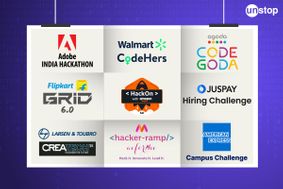
Organize Hackathons: The Ultimate Playbook With Past Case Studies

What is Campus Recruitment? How To Tap The Untapped Talent?
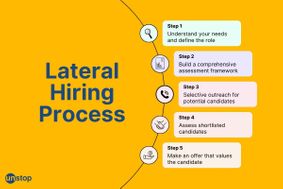
Lateral Hiring: A Complete Guide To The Process, Its Benefits, Challenges & Best Practices
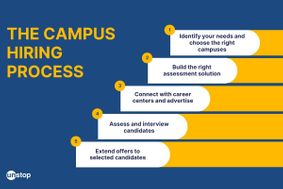











Comments
Add comment